Embracing a New Paradigm in Cosmetic Surgery
Cosmetic surgery is evolving beyond the operating room, embracing holistic wellness principles that consider the whole person—body, mind, and spirit. This comprehensive approach integrates traditional surgical techniques with natural therapies, mind-body practices, and personalized care models to optimize recovery, enhance long-term results, and promote overall health. As patient demand for well-rounded, sustainable aesthetic outcomes grows, so too does the incorporation of holistic strategies into cosmetic surgery, heralding a transformative era in aesthetic medicine.
<!-- VIDEO:eyJsaW5rIjoiaHR0cHM6Ly93d3cueW91dHViZS5jb20vd2F0Y2g/dj1VcDlVenZVZkpGMCIsImltYWdlVXJsIjoiaHR0cHM6Ly9lbmNyeXB0ZWQtdGJuMC5nc3RhdGljLmNvbS9pbWFnZXM/cT10Ym46QU5kOUdjVF9VcHB6RHJWVm1iNDk3aXVwR2lXN19pS1J4LXhlLXcxdHhlSHZyWV9VelZuRSZzIiwidGl0bGUiOiJFcC4gNjUgLSBXZWxsbmVzcyBSZWRlZmluZWQ6IEVtYnJhY2luZyBIb2xpc3RpYyBBcHByb2FjaGVzIC4uLiIsInNuaXBwZXQiOiJXZWxjb21lIHRvIEZ1c2lvbmFyeSBIZWFsdGgsIHdoZXJlIHdlIGV4cGxvcmUgdGhlIGludGVyc2VjdGlvbiBvZiBob2xpc3RpYyB3ZWxsbmVzcyBhbmQgYWR2YW5jZWQgbWVkaWNhbCBjYXJlLiJ9 -->Principles of Holistic Wellness Integrated into Cosmetic Surgery
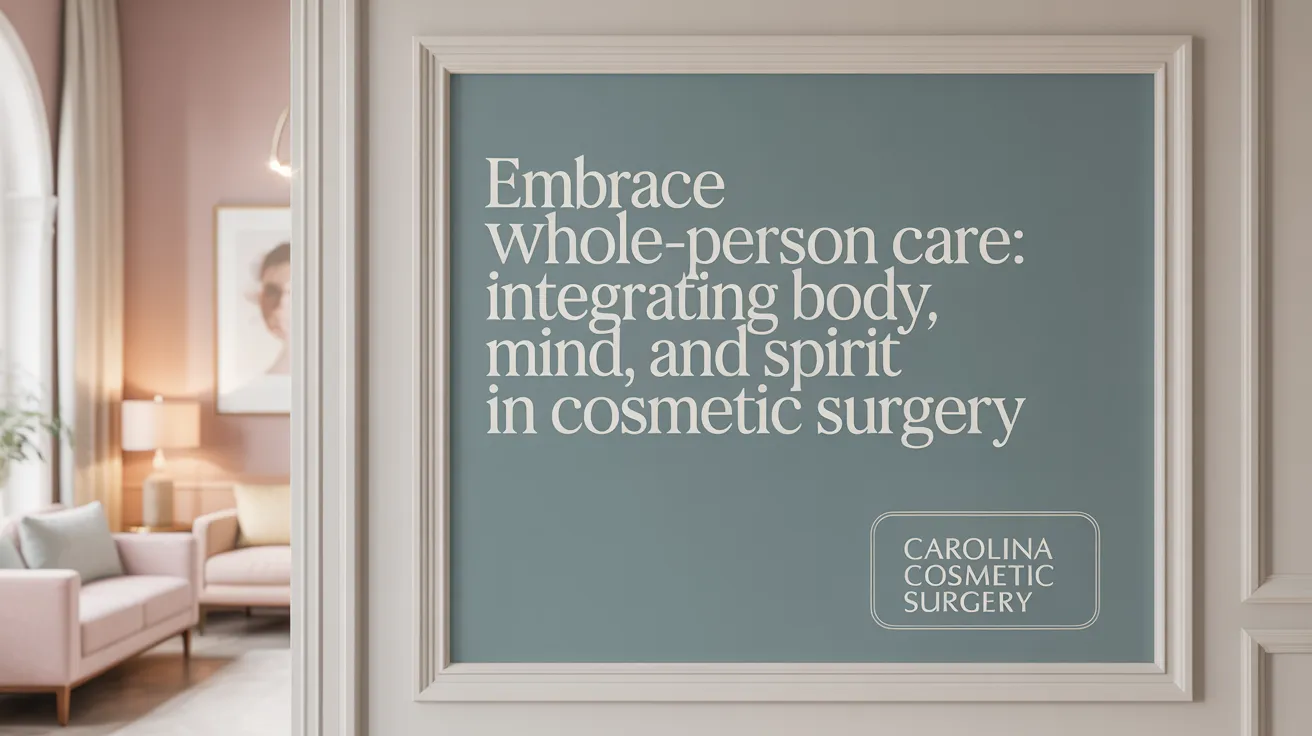
What are the principles of holistic wellness and how can they be integrated with cosmetic surgery?
Holistic wellness centers on treating the entire person—body, mind, and spirit—rather than focusing solely on physical appearance. This approach recognizes that emotional and spiritual health significantly influence physical healing and overall well-being.
In cosmetic surgery, these principles translate into comprehensive assessments that consider a patient's physical health, mental state, and personal goals. Personalization plays a big role, with tailored treatment plans that combine surgical procedures with lifestyle modifications such as improved nutrition, regular exercise, stress management techniques, and natural remedies.
Natural products like essential oils—lavender, chamomile, and frankincense—are often used to support healing, reduce inflammation, and encourage relaxation. Techniques including mindfulness, guided meditation, or breathing exercises complement the surgical process, helping patients manage stress before and after procedures.
The integration of minimally invasive procedures and holistic post-care strategies facilitate the body’s natural healing abilities. This may include skin regeneration therapies, nutritional support through nutraceuticals, and gentle therapies like lymphatic drainage massage.
Overall, blending holistic wellness with cosmetic surgery aims to achieve balanced beauty that is sustainable and aligned with long-term health and inner harmony. This comprehensive approach not only enhances physical results but also promotes emotional resilience and spiritual well-being, leading to a more satisfying recovery experience.
Components of a Comprehensive Care Model in Cosmetic and Aesthetic Surgery
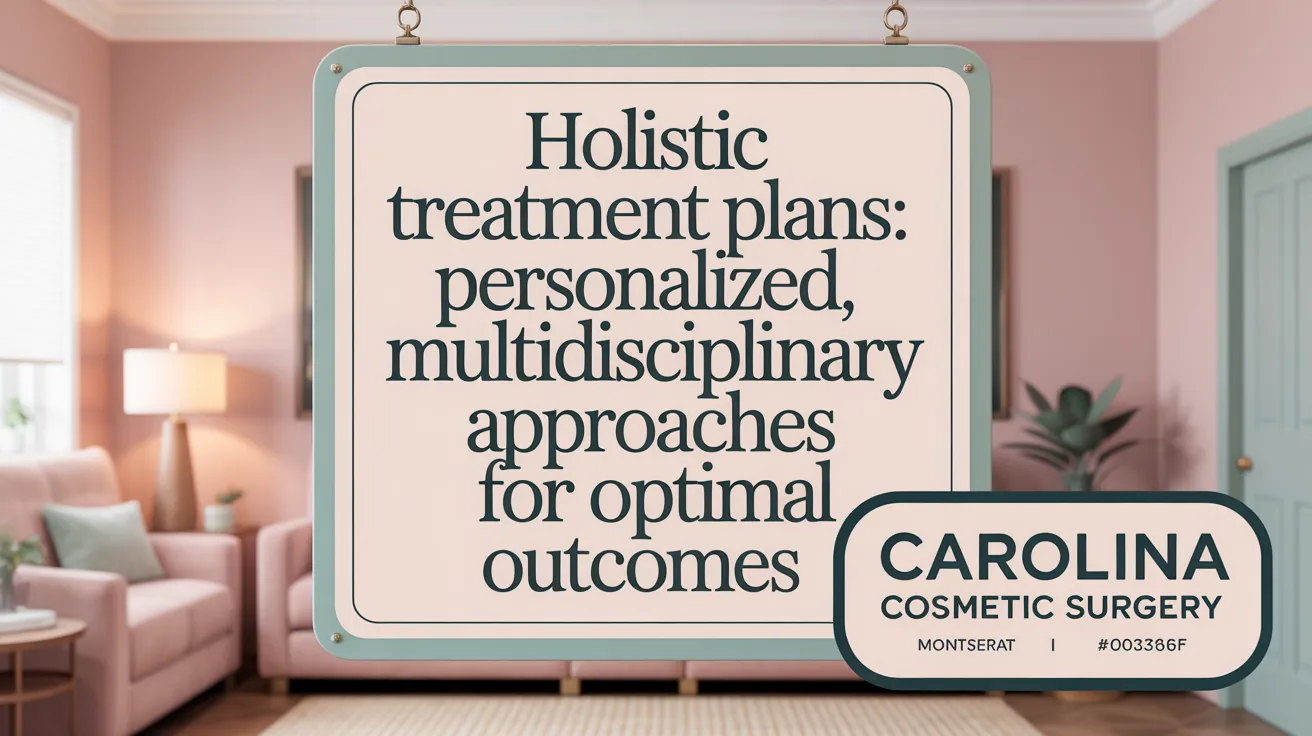
What components and practices make up a comprehensive care model in cosmetic and aesthetic surgery?
A thorough and effective approach to cosmetic and aesthetic surgery involves multiple interconnected components designed to optimize patient outcomes and satisfaction. Central to this model are detailed pre-operative evaluations and extensive patient education, ensuring individuals understand procedures, risks, and recovery expectations.
An essential feature is the combination of surgical and non-surgical treatments tailored to each patient's needs. This might include traditional procedures like rhinoplasty or facelifts complemented by holistic methods such as aromatherapy, mindfulness, and nutritional support to promote healing and emotional well-being.
Multidisciplinary collaboration is vital. Teams often include surgeons, mental health practitioners, nutritionists, holistic providers practicing integrative medicine, and other specialists working together. This collaborative effort supports both the physical and emotional health of patients during their aesthetic transformation.
Post-operative care and long-term wellness strategies are also fundamental. These ensure sustained results and integrate strategies like essential oils—lavender, chamomile, and helichrysum—to reduce inflammation and swelling, or peppermint and eucalyptus for pain management.
Incorporating principles from models like the University of Chicago's Coordinated Care Program (CCP), attention is given to continuity of care, communication aligned with patient preferences, and addressing social determinants of health. This comprehensive approach helps minimize complications, supports mental health, and enhances overall patient experience.
Such a model emphasizes the human aspect—recognizing that aesthetic surgery is not only about external appearance but also about fostering inner well-being. It considers the psychological and social factors influencing outcomes, promoting a more sustainable and satisfying experience.
Overall, a comprehensive, personalized, and coordinated care system embodies these practices, ensuring treatment plans are holistic, patient-centered, and adaptable to individual needs and preferences, aiming for not only aesthetic improvement but also overall health and vitality.
Benefits of Combining Holistic Approaches with Surgical and Non-Surgical Treatments
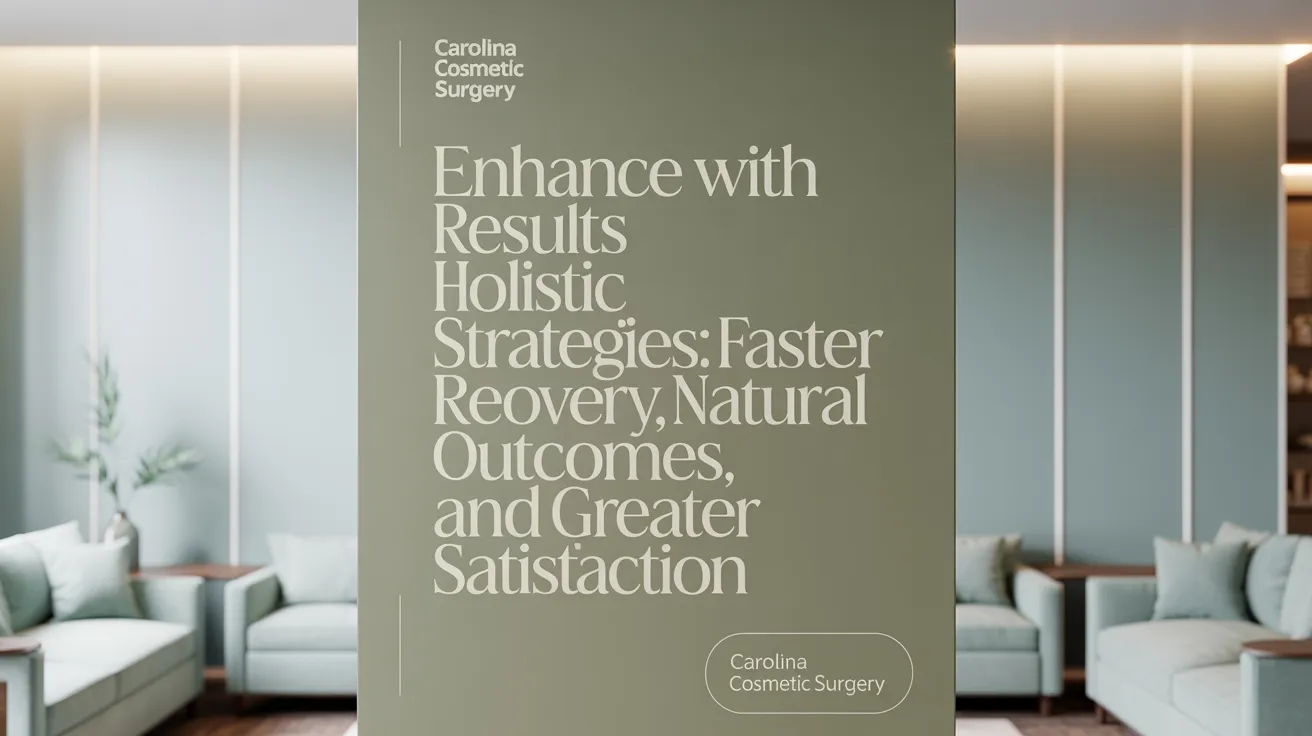
What are the benefits of combining holistic approaches with surgical and non-surgical aesthetic treatments?
Integrating holistic methods into cosmetic procedures offers a broad range of advantages that go beyond mere appearance. One notable benefit is the improvement in skin health and the speed of recovery. Natural remedies like essential oils—such as lavender, chamomile, and helichrysum—are employed to reduce inflammation and swelling, helping the skin heal more effectively. Additionally, nutritional support, hydration, and natural therapies like aromatherapy and massage promote quicker healing and support the body's natural vitality.
Holistic methods also contribute to reducing complications and stress. Techniques like mindfulness, hypnosis, and acupuncture, supported by scientific evidence, can lower perioperative anxiety and nausea, leading to a calmer, more relaxed patient experience. Such approaches help manage pain, minimize swelling, and decrease reliance on medications, including opioids.
Another important benefit is achieving long-lasting and natural-looking results. Holistic skincare routines, personalized recovery plans, and integrative treatments like lymphatic drainage massage support skin elasticity and minimize scarring. These strategies sustain aesthetic outcomes over time, allowing patients to enjoy their enhanced appearance while maintaining a sense of wellness.
Holistic practices also enhance emotional and spiritual well-being, fostering inner balance and confidence. Incorporating practices such as sound therapy, guided meditation, and body-mind activities helps reduce stress, boost self-esteem, and promote mental health. This comprehensive approach aligns outer beauty with inner health, enabling patients to feel more centered and satisfied.
Ultimately, combining these approaches boosts overall patient satisfaction and self-confidence. By creating a treatment experience that considers the whole person—body, mind, and spirit—patients often report better outcomes, increased happiness, and a more natural sense of beauty. This synergy between traditional and holistic care reflects a modern vision of aesthetic medicine, emphasizing sustainable, holistic health and beauty.
| Benefit | Description | Additional Notes |
|---|---|---|
| Skin health and recovery | Use of essential oils and natural therapies to improve healing and reduce inflammation. | Supports faster post-op recovery |
| Reduce complications and stress | Mind–body practices, acupuncture, and hypnotherapy help lower anxiety and nausea. | Evidence-based benefits such as Level II studies |
| Long-lasting, natural results | Holistic skin care and personalized plans promote enduring aesthetic outcomes. | Minimize scarring, support skin elasticity |
| Emotional and spiritual well-being | Practices like sound therapy and meditation foster mental health and self-confidence. | Enhances overall satisfaction |
| Boost in patient satisfaction and confidence | A comprehensive, personalized approach increases trust, happiness, and self-esteem. | Reflects a true sense of inner and outer health |
This integrated approach is expected to grow further, as more patients and practitioners recognize its benefits. Combining conventional cosmetic treatments with holistic practices creates a more complete, healing experience that nurtures both external beauty and internal wellness.
Natural Therapies and Mind-Body Techniques in Post-Operative Recovery
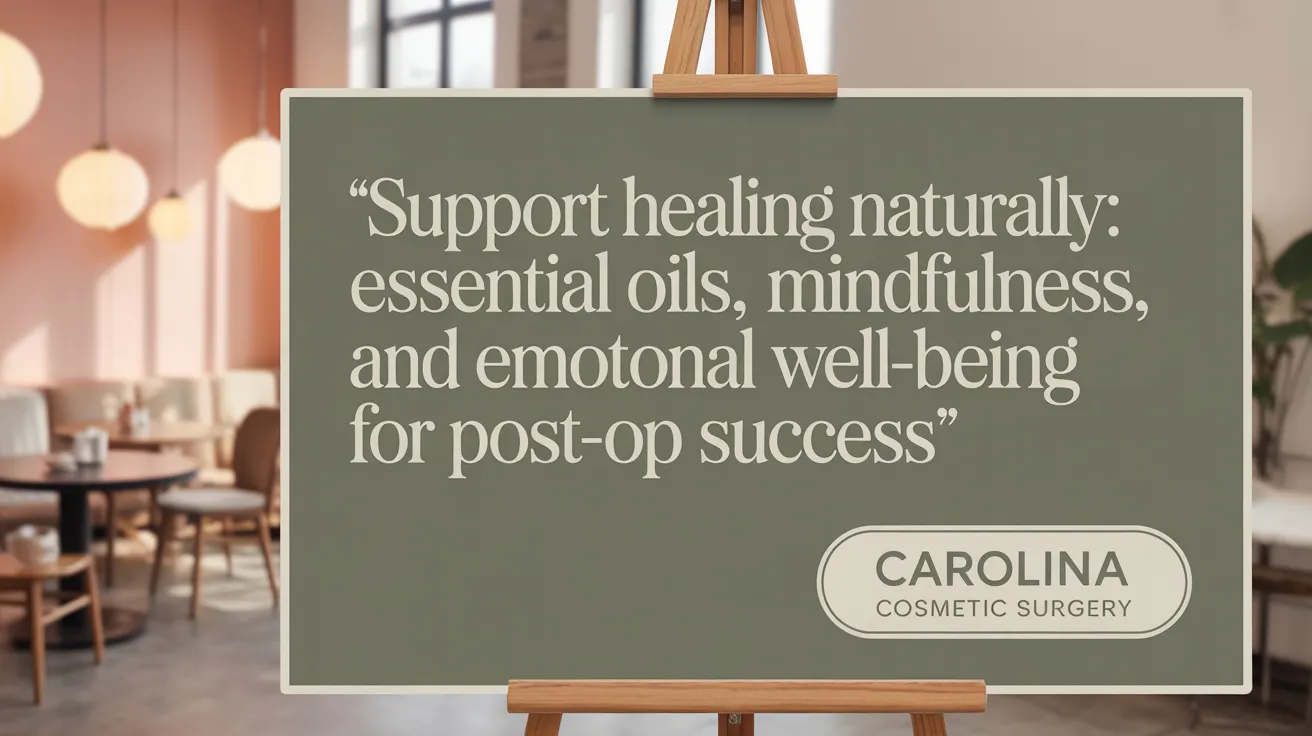
How do natural therapies, such as essential oils, and mind-body techniques contribute to post-operative recovery?
Natural therapies like essential oils and mind-body practices significantly support the healing process after cosmetic surgery. These approaches target not just the physical aspects of recovery but also the emotional and neurological components that influence healing.
Essential oils are widely used for their therapeutic properties during recovery. For example, lavender, chamomile, and helichrysum are popular for reducing inflammation and swelling. Lavender and chamomile also help decrease anxiety and promote restful sleep, which are vital for tissue repair and immune function. Oils like peppermint and eucalyptus are utilized to manage pain effectively, offering a natural alternative to medication.
Supporting skin healing and minimizing scarring is another benefit of specific oils such as rosehip, tea tree, and frankincense. These support tissue regeneration and reduce the likelihood of complications. Moreover, antimicrobial oils like oregano, clove, and thyme bolster immune function, preventing infections during recovery.
Mind-body techniques further enhance healing by helping patients manage stress and emotional distress. Practices such as mindfulness meditation, guided imagery, deep breathing exercises, and sound therapy aid in calming the nervous system. These methods lower cortisol levels and increase the production of mood-enhancing chemicals like serotonin and oxytocin. This biochemical response not only reduces anxiety but also boosts overall recovery.
Integrating these holistic strategies into personalized post-op care plans, under medical supervision, offers a comprehensive approach to enhance healing outcomes. As part of an evolving field called integrative medicine, combining natural remedies with conventional surgical care helps address the whole person—body, mind, and spirit. This approach fosters faster recovery, reduces reliance on pharmaceuticals, and promotes a sense of well-being that supports long-term health benefits.
The future of post-operative recovery is moving toward a more holistic model, where therapies like essential oils and mind-body practices are routinely incorporated into treatment protocols. Evidence suggests that patients benefit from reduced pain, inflammation, and emotional stress, leading to a smoother, more satisfying healing experience.
Clinical Evidence Supporting Holistic Methods in Aesthetic and Reconstructive Surgery
What evidence and clinical support exist for holistic methods within aesthetic and reconstructive procedures?
Supporting the integration of holistic approaches into aesthetic and reconstructive surgery, several studies and clinical observations highlight their benefits. Level II evidence confirms that natural products like arnica can effectively reduce postoperative swelling, or edema, especially after rhinoplasty procedures. Arnica has been shown to decrease inflammation and improve healing, making it a valuable supplement in recovery plans.
In addition, onion extract has demonstrated positive effects on scar healing, particularly in reducing pigmentation and promoting better skin repair. Its application can lead to more favorable aesthetic outcomes with less visible scarring.
Mind-body practices like hypnosis and acupuncture also show promising results. Hypnosis has been supported by Level II evidence for helping patients manage perioperative anxiety, which can reduce stress and improve overall surgical experience. Similarly, acupuncture has been shown to alleviate nausea and discomfort after surgery, contributing to smoother recoveries.
This evidence base suggests that holistic therapies are not only safe but also enhance the efficacy of traditional surgical approaches. They can improve patient comfort, reduce reliance on medications, and support natural healing processes.
Psychological and safety considerations in holistic approaches
A comprehensive approach emphasizes personalized care, considering psychological factors such as anxiety and body image concerns. Ensuring safety involves thorough understanding of potential risks, such as bleeding risks associated with natural products like ginkgo and kelp, which may increase bleeding tendencies.
The timing of therapies and their interactions with surgery are critical. For instance, integrating mind-body practices at appropriate stages can optimize outcomes without compromising safety.
Potential impact on patient satisfaction and economic benefits
Patients appreciate a holistic approach that addresses physical, mental, and emotional health. Many express higher satisfaction levels when holistic methods are incorporated into their treatment plans. Additionally, faster recovery times and reduced medication use can lead to economic benefits, including decreased healthcare costs and quicker return to daily activities.
Current research gaps and future directions
While existing studies provide encouraging results, more rigorous randomized controlled trials are needed to solidify evidence and establish standardized protocols. Future research should explore the long-term effects of holistic therapies in aesthetic and reconstructive surgery, as well as their impact on mental health outcomes.
Advances in personalized medicine and diagnostic tools will likely enable more tailored holistic treatments. As the field grows, interdisciplinary collaboration between surgeons, naturopaths, psychologists, and integrative medicine practitioners will be essential to optimize patient care.
The integration of holistic methods aims to not only improve surgical results but also to foster a more comprehensive, patient-centered approach to aesthetic health and well-being.
Patient-Centered, Multidisciplinary Care: Enhancing Overall Beauty and Health
Why is a patient-centered, multidisciplinary approach important in promoting overall beauty and health in aesthetic care?
A comprehensive approach that focuses on the individual patient is essential in aesthetic medicine. It ensures treatments are customized to each person's unique characteristics, goals, and lifestyle, which increases satisfaction and safety.
Incorporating perspectives from different healthcare fields—such as dermatology, plastic surgery, psychology, and integrative medicine—provides a well-rounded understanding of the patient's needs. This collaboration leads to more precise assessments and tailored treatment strategies.
Building trust between patients and practitioners is a cornerstone. Clear communication and ongoing follow-up help address concerns, manage expectations, and support long-term success.
Safety and ethical standards are critical, especially as aesthetic procedures evolve. A multidisciplinary team helps uphold these standards, minimizing risks and ensuring responsible practice.
When teams work together, patient outcomes improve, and the quality of care rises. This approach fosters professionalism among providers and aligns with best practices for holistic health and beauty.
By embracing a patient-focused, multidisciplinary framework, aesthetic care becomes not just about appearance but also about enhancing overall well-being, making it a sustainable and ethical practice.
Scope and Application of Holistic Wellness Strategies in Aesthetic Care Programs
What is the scope and application of holistic wellness strategies in aesthetic care?
Holistic wellness strategies in aesthetic care encompass a broad range of approaches that combine physical treatments, nutritional guidance, psychological support, and lifestyle modifications. These strategies aim to improve not just the aesthetic outcome but also to enhance overall health and well-being.
Throughout the patient journey, from initial consultation to post-procedure recovery, holistic approaches are integrated to provide personalized and comprehensive care. For example, preoperative plans may include mindfulness techniques, nutritional support, and natural remedies such as essential oils to reduce stress and promote healing. Postoperative care often involves tailored therapies like aromatherapy, massage, and mind-body practices to facilitate recovery and mental well-being.
Training programs for aesthetic professionals reflect this integrative approach. The CNAP (Certificate in Natural Aesthetic Practice) Training Program demonstrates how licensed estheticians learn to incorporate holistic skincare practices that consider the connection between mind, body, and skin. These programs emphasize educating practitioners on delivering treatments that support systemic health and promote lifelong wellness.
In surgical and nonsurgical nursing, the focus on safety and health optimization aligns with the principles of holistic medicine. Patient advocacy becomes crucial, ensuring that individuals receive treatments that are both effective and safe while respecting their unique physical, emotional, and spiritual needs.
The overarching goal of implementing holistic wellness strategies is to provide aesthetic care that surpasses superficial improvements. It fosters systemic health, reduces risks, and ensures long-term benefits, making beauty an expression of overall vitality and well-being.
Emerging Holistic Practices Shaping the Future of Aesthetic Care
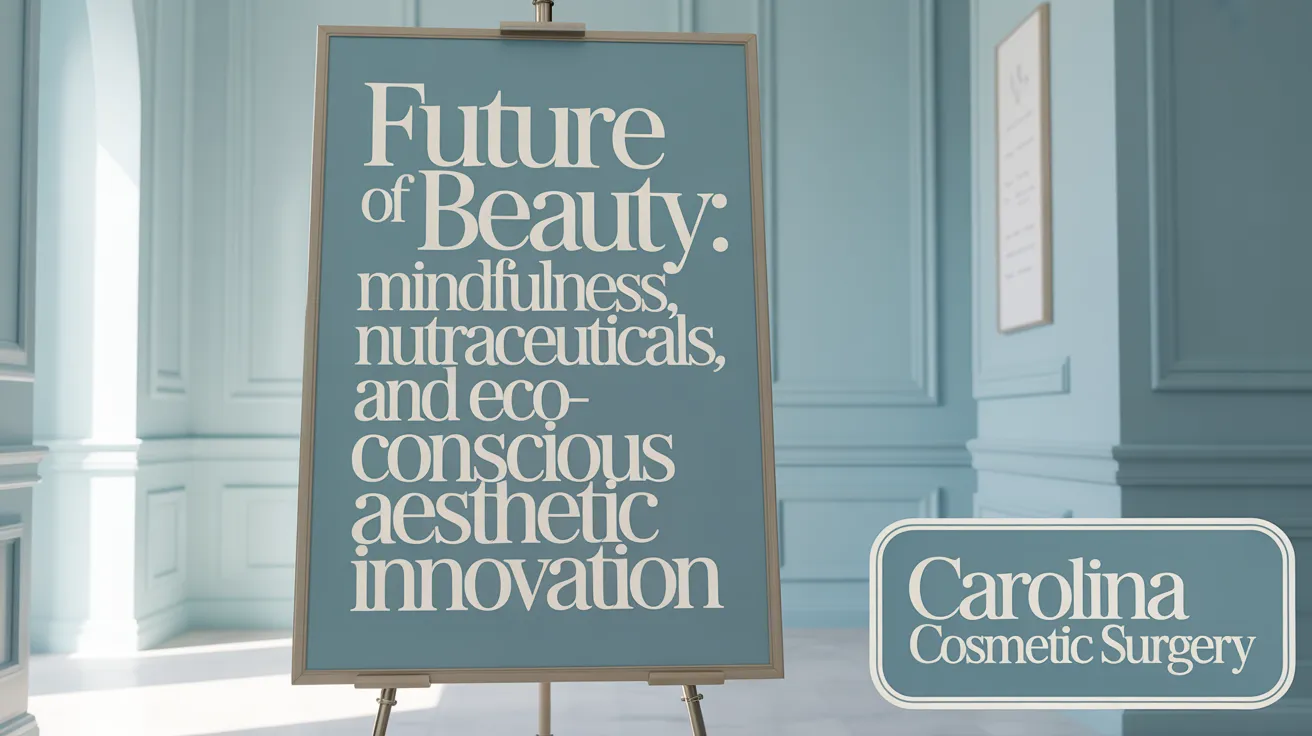
Mindfulness-based beauty treatments
In the evolving landscape of aesthetic care, mindfulness-based approaches are becoming increasingly popular. Treatments like guided meditation during facials, breath work integrated into body contouring sessions, and sound therapy using LED lights are designed to boost relaxation while enhancing aesthetic results. These practices help reduce stress, improve mental health, and support the body's natural healing processes, creating a more comprehensive approach to beauty.
Nutraceuticals and IV therapies
Nutraceuticals—nutritional products aimed at improving health—and intravenous (IV) therapy are making their way into holistic wellness routines. Customized vitamin infusions can support skin vitality, reduce oxidative stress, and promote overall health. These therapies complement cosmetic procedures by addressing internal health, which reflects outwardly through skin radiance and resilience.
Fitness integration with aesthetic treatments
Fitness is increasingly woven into aesthetic care plans, especially for patients using weight management medications like GLP-1 analogs. Emphasizing low-impact strength training helps maintain muscle mass, support skin elasticity, and achieve natural-looking results. Combining physical activity with aesthetic treatments ensures a balanced approach to maintaining youthful, healthy skin.
Sustainability and eco-conscious practices
Environmental concern influences future aesthetic procedures, with eco-friendly skincare products, sustainable tools, and environmentally conscious treatments becoming standard. These practices not only reduce ecological footprints but also appeal to patients seeking ethically responsible care, aligning beauty with sustainability.
Advanced personalized diagnostic tools
Technological advancements enable highly individualized treatments. Diagnostic tools can assess skin condition, wellness levels, and genetic factors, guiding tailored aesthetic interventions. This personalized approach enhances results' longevity and authenticity, fostering greater patient satisfaction.
| Practice Area | Benefits | Supporting Evidence | Future Trends |
|---|---|---|---|
| Mindfulness and sound therapy | Stress reduction, better healing | Increasing clinical integration | Use of guided meditations, sound baths |
| Nutraceuticals & IV therapy | Skin health, reduced oxidative stress | Growing patient demand | Custom vitamin infusions |
| Fitness & physical activity | Maintains muscle, supports skin elasticity | Research on muscle and skin health | Integration with aesthetic routines |
| Eco-conscious practices | Reduced environmental impact, ethical appeal | Industry shift towards sustainability | Eco-friendly products and tools |
| Diagnostic tools | Custom treatments, improved longevity | Advancements in technology | AI-driven personalized care |
As holistic wellness continues to influence aesthetic care, practitioners will increasingly adopt these practices to promote not only external beauty but overall well-being. This integrated approach aims to provide more satisfying, natural, and sustainable results for patients in the years ahead.
Economic and Quality-of-Life Benefits of Holistic Aesthetic Care Models
Holistic approaches to cosmetic surgery not only benefit patients’ well-being but also bring economic advantages to healthcare systems. By integrating natural therapies and mind-body practices, patients often require fewer medications post-surgery, reducing dependence on opioids and other pharmaceuticals.
Studies indicate that these integrative methods can facilitate faster recovery times and lower the risk of complications such as inflammation, swelling, and infection. This leads to shorter hospital stays and less need for additional medical interventions, which ultimately decreases healthcare costs.
Enhanced patient satisfaction is another vital aspect of holistic care. Patients who believe in self-healing and undergo personalized treatment plans report higher levels of well-being and confidence in their outcomes. The focus on mental and spiritual health alongside physical healing contributes to a more positive experience.
Economically, holistic methods may prove cost-effective by minimizing the use of pharmaceuticals, reducing follow-up procedures, and speeding up recovery. This not only benefits patients but also lessens the financial burden on healthcare providers.
Broader implications include the potential to reshape healthcare systems around preventative and integrative care models. Increasing evidence supports their role in improving perioperative outcomes and quality of life, which aligns with a shift toward more sustainable, patient-centered healthcare.
| Aspect | Benefits | Additional Notes |
|---|---|---|
| Medication Reduction | Decreases dependence on opioids and other drugs | Supported by evidence showing fewer side effects and quicker recovery |
| Recovery & Complications | Faster healing and fewer issues | Leads to shorter hospital stays and less additional care |
| Patient Satisfaction | Improved mental well-being and self-healing beliefs | Higher satisfaction rates and positive perceptions |
| Cost-Effectiveness | Lower healthcare costs | Reduced need for medications and reoperations |
| Healthcare Implications | Shift to preventive and holistic models | Fosters sustainable, patient-centered healthcare systems |
The Integrative Path Forward in Aesthetic Medicine
The integration of holistic wellness principles with cosmetic surgery marks a paradigm shift in aesthetic medicine. By addressing the whole person—physical, mental, emotional, and spiritual—this comprehensive care model supports optimal healing, enhances the durability of cosmetic outcomes, and enriches patient satisfaction. Evidence-based natural therapies, multidisciplinary collaboration, and personalized recovery plans together create an environment where beauty and health coexist harmoniously. Looking ahead, the continued adoption of mindfulness-based treatments, sustainable practices, and advanced diagnostics promises to deepen this integrative approach. As holistic wellness becomes central to aesthetic care, patients can expect not only transformative appearance enhancements but also profound improvements in overall well-being, making beauty a true reflection of inner health and vitality.
References
- The Integration of Holistic Approaches in Cosmetic Surgery
- Integrative Medicine and Plastic Surgery: A Synergy—Not ...
- The Holistic Wellness Revolution In Aesthetics
- Integrative Medicine in Plastic Surgery: A Systematic ...
- Benefits of Combining Medical Aesthetics With Holistic Wellness
- 7 Unexpected Benefits of Holistic Aesthetic Treatments
- The Holistic Wellness Revolution In Aesthetics
- Integrating Wellness: A Holistic Approach to Aesthetics
